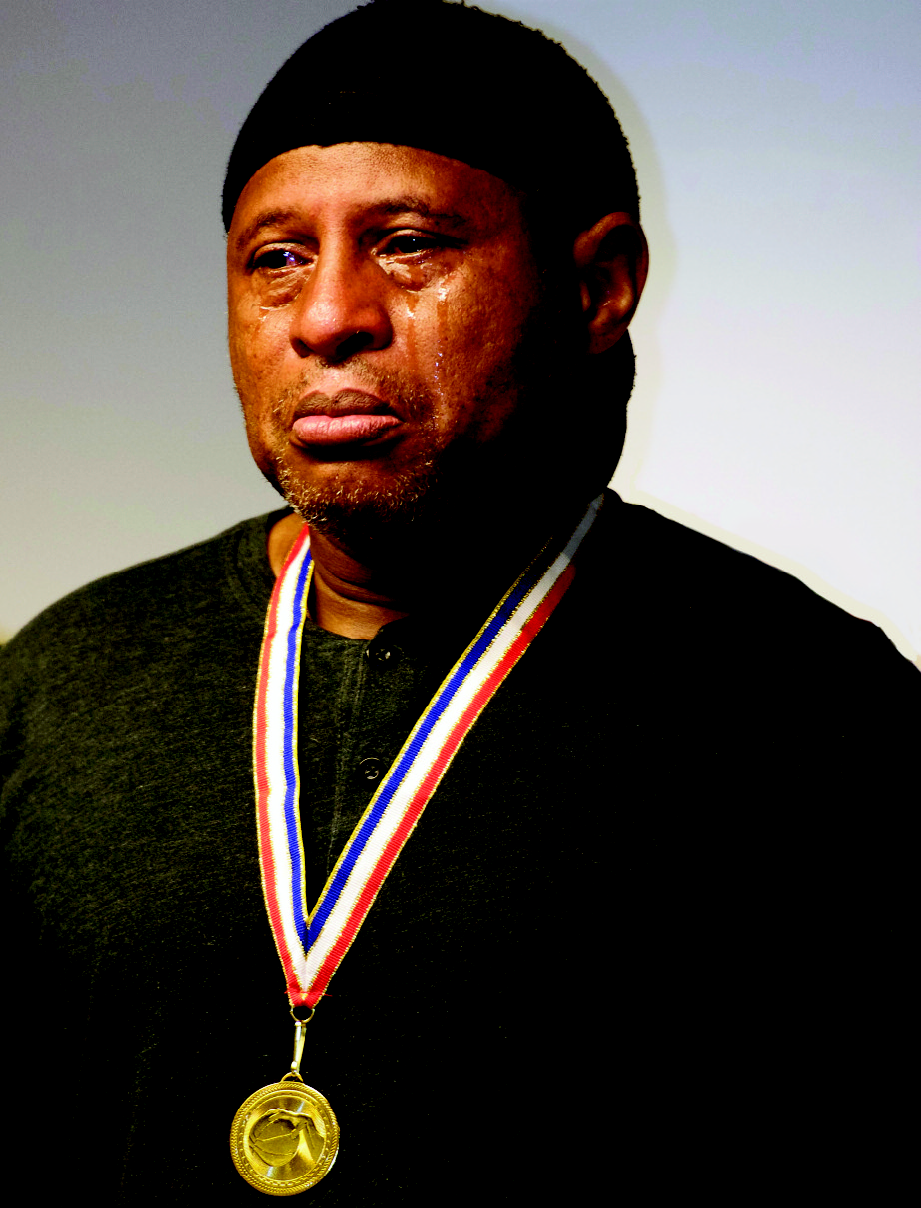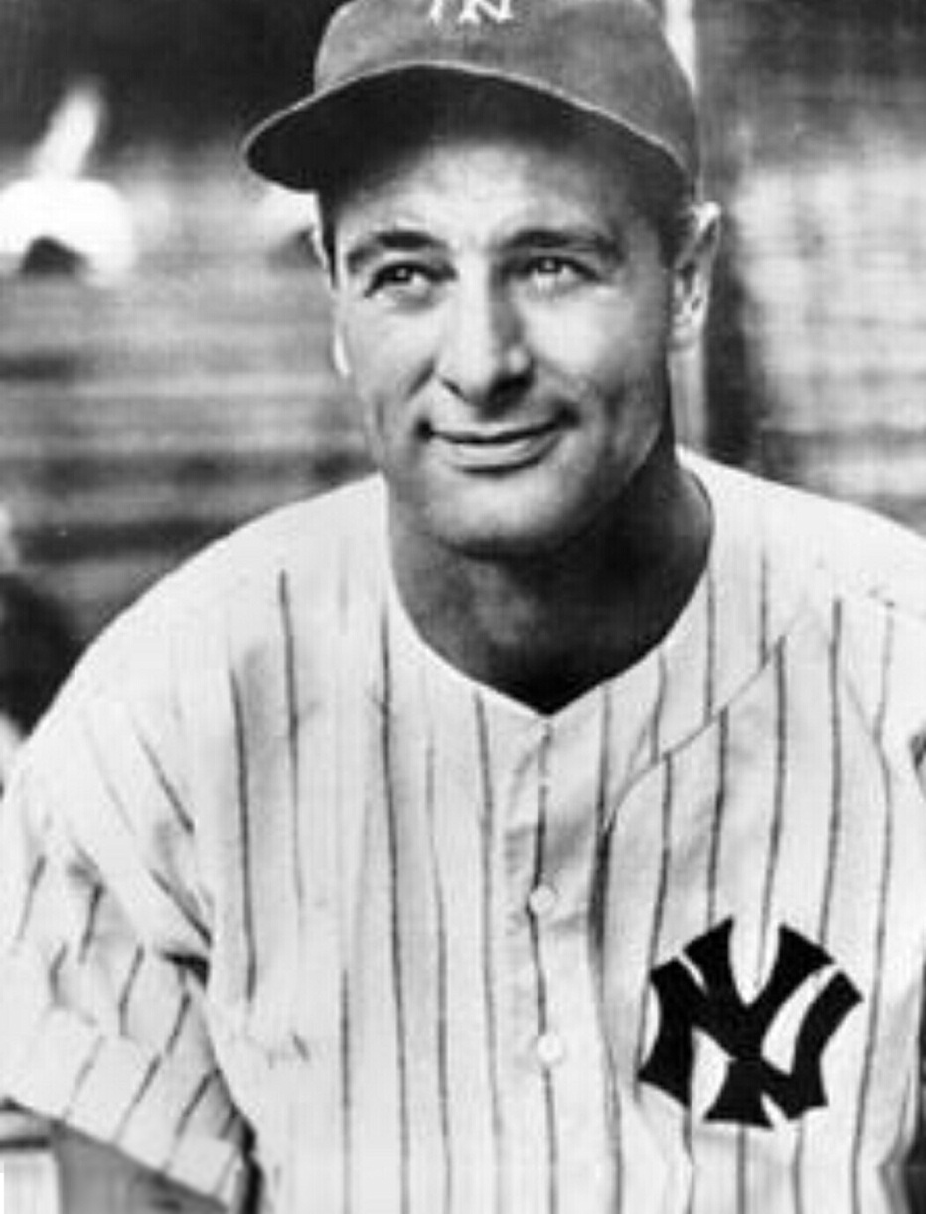

IRON SPIRITS: (Above) James Long and Lou Gehrig. James has accepted the invitation to become Assistant Basketball Coach and help keep the winning tradition alive in east Tennessee.
A Whistle for James
James Long was one of the Orange Grove athletes that was given a chance to speak. When he approached the microphone, the room went silent. James is a 54-year-old, highly-competitive guy who has been a Special Olympics athlete for 40 years.
Lou and James took their turns saying good-bye. Their good-byes were 79 years apart.
Both Lou and James were athletes and were devastated with the realization that they were no longer able or capable to continue to play the game they loved. Both of them brought tears to those who listened to them say, "Good-bye."
While one of them had to retire because of a life-threatening illness and the other one had to retire because of injuries and an aging body, it's fair to say their "farewells" were equally from the heart. Both farewells were stirring, impactful and unforgettable. Lou Gehrig, known as "the Iron Horse" was the New York Yankees' first baseman from 1923 to 1939, playing in 2,130 consecutive games, a record back then. His farewell speech given on July 4, 1939 at Yankee Stadium (now known as Lou Gehrig Day) is considered the most famous speech in baseball (if not all sports) history. Gehrig was diagnosed with a progressive, fatal, neurodegenerative disease (amyotrophic lateral sclerosis, now known as Lou Gehrig's disease) which killed him less than two years after giving his speech. The most famous part of his speech was when he said, "Today I consider myself the luckiest man on the face of the earth."
He expressed his appreciation for his years as a member of the Yankees and for the opportunity to play the game he loved. It is doubtful that there will ever be a "farewell" speech from an athlete that will be remembered eighty years after its delivery. For one thing, most athletes don't retire because of a fatal disease, and most retirement speeches are now handled by public relations firms, managers and "handlers." Gehrig's speech was from the heart and it left the 62,000 fans in the ballpark and thousands more listening to the radio devastated and crushed. He was a legend. There have been other noteworthy farewell speeches. Brett Favre, one of the NFL's greatest quarterbacks said, "It's over. As hard as it is for me to say, it's over."
Sachin Tendulkar was known as the god of Indian cricket and had fans all over the world. When he retired he made reference to all the friends he had made, playing cricket—and how happy he was to be able to add them to all the friends he had from his childhood. His speech left millions of fans in tears. He called attention to the fact that for the rest of his life he will always hear the crowds cheering "Sachin, Sachin," and the sounds would reverberate in his ears until the day he would stop breathing.
When Wayne Gretzky, perhaps the greatest professional ice hockey player, hung up his skates, he said, "We're human, we bring it home, and we're highly emotional athletes. We're all lucky we have good people behind us and I know I have a great wife. She's there through thick and thin. I think we're both at peace of mind today. Today, I want to enjoy this and want to celebrate this. I just want to thank everyone who I ever played with and who was ever in an organization that I was part of, whether it is Team Canada Junior, or Team Canada, or the Olympic team, I loved it. Thank you."
In April, the Orange Grove Center in Chattanooga held a tribute sports luncheon for their Special Olympic athletes at the conclusion of spring games. The luncheon was hosted by the University of Tennessee at Chattanooga's Department of Health Promotion and Human Performance and held on campus at their sports center. Athletes from the various teams (basketball, bocce, bowling, volleyball) had the opportunity to tell the audience (athletes, coaches, volunteers, fans, partners and supporters) what it meant to be a Special Olympic athlete. The support for each other was palpable and you could not count the high fives, back slaps, hugs, handshakes and fist bumps. While they each cherished the awards (and the pizza) it was "being there" that mattered most. Each athlete vowed to do better next season and promised more gold in their future.
James Long was one of the Orange Grove athletes that was given a chance to speak. When he approached microphone, the the room went silent. James is a 54-yearold, highly-competitive guy who has been a Special Olympics athlete for 40 years. He started out as a runner when he was 14 and has competed in track, basketball, volleyball, bowling and flag football. He earned enough gold to make Indonesia's Grasberg Gold Mine sit up and take notice.
James grasped the microphone, took a deep breath and blew into the microphone to make sure he was live. One deep breath wasn't enough so he took a long second one. Fighting back the tears he said, "I am here to announce the end of my career as a proud Special Olympics athlete. I have had knee surgery and was told by my doctors to stop running and playing so hard. That was two years ago and now I know they knew what they were talking about. My other knee was injured and I know I can't do my best for my team members." The room filled with his fellow team members started to shout, "James, James, James." They rushed up to him and hugged him and an epidemic of tears and unadulterated crying ensued.
A s it turned out, representatives from Special Olympics International were on site visiting Orange Grove to learn more about the center's rich Special Olympics past and continuing legacy. Senior Vice President for Sport and Health, Drew Boshell, along with Founder of the Healthy Athletes movement, Dr. Steve Perlman, and Executive Director of the Golisano Foundation, Ann Costello, sponsors of Healthy Communities, quickly became part of the sea of huggers, back slappers and tear blotters.
James expressed what Special Olympics has meant to him: "Special Olympics has been part of my life forever. I made my best friends from being on the teams. It meant going out and having fun. It meant going to places I could not have gone to by myself. It meant telling people about how it felt to be a winner. It let me prove to people that I can learn and improve. In the last two years it let me play on the same team with athletes with no disabilities. I will miss it but it will always be a part of me."
James was correct in that Special Olympics will always be a part of his life. At the luncheon tribute, Hal Baker, the Coordinator of the Orange Grove Special Olympics program announced that Athlete James Long had accepted the invitation to become Assistant Coach James Long. James will join the coaching staff of the basketball team and help his former teammates continue to keep the winning tradition alive in east Tennessee. It was obvious that James felt that he was the luckiest man on the face of the earth. To those of us in the room, there was no doubt that he was. To those who ask the question, "What exactly does Special Olympics mean to the athletes?" the accompanying photo of James taken while announcing his retirement provides the answer: "It means everything." Later that afternoon James was seen practicing blowing into his new chrome whistle. •
ANCORA IMPARO In his 87th year, the artist Michelangelo (1475 -1564) is believed to have said "Ancora imparo" (I am still learning). Hence, the name for my monthly observations and comments. — Rick Rader, MD, Editor-in-Chief, EP Magazine Director, Morton J. Kent Habilitation Center Orange Grove Center, Chattanooga, TN